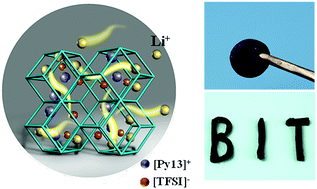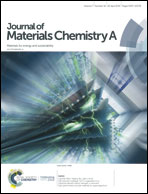A Li+ conductive metal organic framework electrolyte boosts the high-temperature performance of dendrite-free lithium batteries†
Abstract
Conventional electrolytes of Li metal batteries are highly flammable and volatile, which accelerates the consumption of lithium metal at high temperatures, resulting in catastrophic fires or explosions. Herein, a Li+ conductive metal organic framework electrolyte was prepared to enable dendrite-free Li deposition at high temperatures. This electrolyte stabilizes the electrolyte/electrode interface by promoting the transport of lithium ions and suppresses the formation of Li dendrites by forming a particle-rich coating over the anode during repeated Li plating/stripping. Benefitting from strong interactions between TFSI− anions and the metal atoms of the MOF, the electrolyte demonstrates excellent electrochemical properties, which allows Li/Li cells to operate at 150 °C for more than 1200 h without major voltage fluctuations, markedly increasing the stability of Li metal at high temperatures. Furthermore, Li/LiFePO4, LiNi0.33Mn0.33Co0.33O2, Li/LiNi0.8Mn0.1Co0.1O2 and Li/Li4Ti5O12 cells exhibit excellent performance at high temperatures.



 Please wait while we load your content...
Please wait while we load your content...